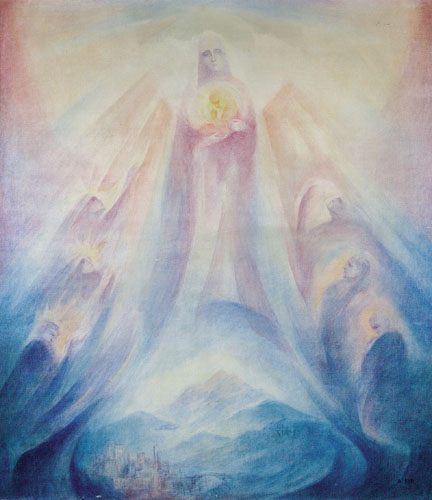International Newsletter Advent 2013
This newsletter is password protected; the password is, advent.
[download id=”119″]
This newsletter is password protected; the password is, advent.
[download id=”119″]
Many of the inner pictures connected with the birth of Christ, with the Nativity that we carry in our imaginations, place the light filled holy family into a protective sheath of surrounding darkness. We can think of Rembrandt’s Nativity, or of Ninetta Sombart’s Birth of Christ and sense the sheltering quality that the darkness lends to the holy event of his birth. The Christ Child is received into the blanket of night and, in equal measure the darkness of night has a role to play in the events surrounding Christ’s birth.
We can thus begin to distinguish between different qualities of darkness. Read more
In the Gospels we have two descriptions of the Mother of God. The feeling-tone of each is different. In  Luke, she is the one to whom the angelic messenger announces the coming of God’s son through the inseminating power of the Holy Spirit. She is humble and open, experiencing an other-worldly event.
Luke, she is the one to whom the angelic messenger announces the coming of God’s son through the inseminating power of the Holy Spirit. She is humble and open, experiencing an other-worldly event.
The Mother in Matthew’s Gospel receives royal gifts. She must flee to Egypt to save her little Son from Herod’s persecution. In John’s Gospel she stands under the cross. Mother’s innocence has become bitter experience, but she also partakes in her Son’s subsequent rise from death.
One of the greatest leaders of our time, the late Nelson Mandela once said…

Photo by Geoff Sims/Colin Legg
“As I walked out the prison door toward the gate that would lead to my freedom, I knew if I didn’t leave my bitterness and hatred behind, I’d still be in prison.”
Thus spoke the lion of Africa, who for 27 years was imprisoned- not for crimes- but for his moral ideals. One can only imagine how much resentment and anger, how much darkness filled a human soul such as his who was so unjustly imprisoned for such a long time.

By Bernhard Eyb
Thou mothering earth
Hast received the live seed
Into the dark
Good shelter of soil.
The mantle of night
Thrown wide over us,
And the sun as it goes
Its swift and short journey,
Speak to our hearts
In warning and promise.
Thou Earth hast borne up
The footsteps of Mary
Journeying patiently
Southwards to Bethlehem;
And the Earth bears us
Today in our travail,
That we may bring forth
Christ in our spirit.
So may we await Him
Sent by the Father
Healer and bringer
Into our being
Of the true gold.
Adam Bittleston, in Meditative Prayers for Today, available at http://www.steinerbooks.org/
Lord among the seven candles!
Giver of the light undarkened!
Helper of the souls who struggle
With their passions’ bitter visage
On the wide stairs of the Night—
Thou who bearest from the Father
Sun-Life changeful and unchanging,
Healing for the spirit’s weakness
When it weaves from wandering shadows
Error that denies Thy Being—
Christ whose love calls forth the roses
From the cross on which we suffer;
Guardian of the door to Heavens
Where the deeds on earth unfinished
Through God’s grace prepare fulfillment—
Thy strong soul unite our feeling
With the souls of men who journey
From the earth to distant star worlds;
And with those who seek the entry
To the earth which Thou has hallowed.
Adam Bittleston, in Meditative Prayers for Today, available at http://www.steinerbooks.org/
Movie review and Anthroposophical commentary by Arthur Hildreth Jr.
The next time you are in front of the mirror take a good hard look and ask yourself, Am I a zombie? In fact, take note of your behavior in the company of others and ask again, Am I a zombie? You might also look around you and take note of anyone else you think might be a zombie. You may be surprised with what you find out about yourself and the people you think you know and those you see at school or work nearly every day. You may even believe the buzz in the media and the subject of some six hundred movies in the last forty years of a coming zombie apocalypse. You might even believe you are living it, or not living!
Until recently, zombie movies have been more a warning of impending doom depicting flesh-eating corpses whose condition spreads to all who are injured, eaten or killed by them. The term Zombie has many meanings in today’s culture from a mixed alcoholic drink to a flesh eating reanimated corpse. Warm Bodies a Zombie movie based on Isaac Marion’s novel and released in February 2013 has an advertising tagline, “He’s still dead but he is getting warmer.” This movie, taking place mostly after the “Zombie Apocalypse”, is a romantic comedy and offers hope rather than doom. Read more
Click on link to access the Newsletter in English.
[download id=”109″]
The password is michaeli.
A sermon given after the gospel reading from Matthew 22: The Parable of the Wedding Feast.
We often speak of Knighthood in the time of Michaelmas, as in the song: “Let me of God a fighter be, in the knighthood of the Grail!” And in a festival for children, we may bring to the children the ideal of the knight: to ever serve the Good; and test them with challenges of aim, balance and courage which can help them serve and develop knighthood in themselves.
The highest ideal of the knight however is something called Minne, what often is simply translated as LOVE. But this love is something different than the often sentimentalized “chivalric love” of the age of knights—it is far more than anything personal. This love that the knight aims to develop is not merely a protective love for the “damsel in distress”, but rather, a far-reaching love of humanity which longs to serve the divine in each human being. It is a love seeking the essential being of the other, that which is most important and true. The knight seeks and serves that which is becoming in the other as a highest ideal and a life task.
A meditative prayer by Adam Bittleston
We need in the light of our day
The eternal Light of the Word of God.
When we see with our thoughts this Light
On the path which leads from the cave
Where thinking and seeing our shadows,
Into the fields of life
Into the freedom of the heart—
We shall meet Michael
Who reveals how Christ
Awakens thinking
That it may serve God. Read more
